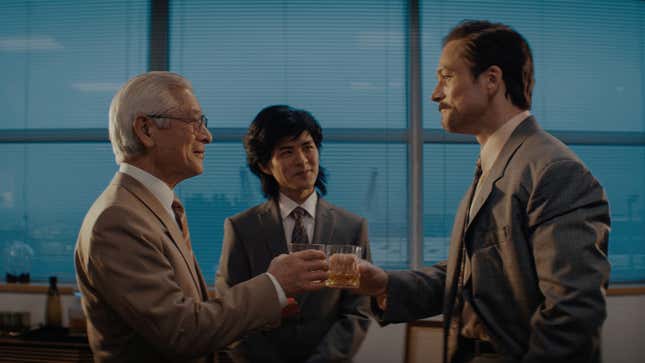
On its face, Tetris seems like it should be the first Oscar-bait video game film. A plucky programmer-turned-video-game-salesperson sees the magic of a new game called Tetris and goes to Soviet-era Russia to get the rights, all while fending off corporate greed and the KGB to boot. Part-biographical flick, part-heist movie, Tetris should be as captivating as watching all those colorful blocks slot into place. But it just isn’t.
Instead, Apple TV+’s Tetris offers a wholly competent but flat movie that will likely be forgotten shortly after you watch it. And it’s a shame, because behind the lackluster performances and sloppy political messaging, is a fascinating tale of gaming history.
A brief Tetris movie review
Every character feels dry, failing to rise to the grandeur of the neo-thriller story they’re placed in. No one’s character comes alive on screen, no one feels truly worth caring about. In a movie where the ending is already known, Tetris needs to make its audience invest in the people it centers for two hours, an achievement it fails to reach.
That failure comes, in part, from presenting us with exceedingly one-dimensional characters. Protagonist and real person Henk Rogers, played by Taron Egerton, is just a good guy who would never try to do anything wrong. Everyone else is the bad guy, and he’s just caught up in this mess! In fact, he’s such a good guy that everyone around can sense his impeachable morality, including those distrustful Russians.
Read More: Film Critic Who Loves Tetris Movie Had Never Heard Of Tetris
This flatness may be due to the fact that the real-life Rogers is an executive producer for the film, along with his daughter (who now runs The Tetris Company), and Alexey Pajitnov, who invented Tetris and went on to found said company along with Rogers. The antagonists are almost comically villainous and just as shallowly evil as Rogers is shallowly good.
Add these overly simple characterizations to the fact that Roger Allam, who plays Robert Maxwell, is in a fat suit, and you’ve got a bit of a mess. And Rogers, who is Dutch and Indonesian, is played by a white British man several shades lighter than him. It’s 2023, and we’re still doing this? At the very least, I hope Rogers would have had more agency in his casting as an executive producer than others who have been white-washed in movies and shows previously. It’s disheartening to see.

The black-and-white paint job stretches beyond the characters and bleeds into the political backdrop in a way that, unsurprisingly, lacks nuance. Tetris reduces the capitalism vs. communism ideological debate to freedom, Coca-Cola, and Levi’s jeans, vs. bleak unsaturated tones and fascist repercussions if you even sneeze wrong. Unlike Tetris, I won’t pretend the political systems of Iron Curtain-era Soviet Russia are simple enough to explain here. And while the historical context feels impossible to ignore, especially in a story littered with executives trying to secure a business deal, the movie falters when it tries to comment on the landscape. Without spoiling more than what a history book can already tell you, Tetris ends on a note implying that securing the rights to this game played some kind of role in the fall of Soviet Russia. Maybe it did in some way! But this film certainly didn’t convince me of that.
Watch: The Team Behind Tetris On The New Movie And Gaming History
In addition to knowing the outcome of the U.S.S.R., you’re probably also aware that the rights to Tetris did eventually make it out of the country. Still, I wanted to be convinced of the stakes for Rogers and everyone else involved in that moment. We know that he’s bet the house (literally) and his and his wife’s business. But neither he nor the movie as a whole ever sell that to me. Rogers certainly mentions this a lot, but I never feel like he’s truly afraid of losing everything. The film also distracts itself by adding the threat of the Russians ruining his life, marriage, and reputation to the alleged house gambling scenario, muddying the stakes. What should we be worried about for Rogers? I can’t keep up! I also fail to believe that the Game Boy wouldn’t have sold gangbusters for Nintendo, with or without Tetris.
More tragically, Tetris has the unfortunate timing of coming out around the release of Air, another film set in the ‘80s about a history-making deal (this time about basketball player Michael Jordan signing with Nike’s floundering basketball division and bringing out the über successful Air Jordans line). Both have a great deal in common, between the ‘80s business backdrop and plots that center around the closing of a deal we already know the ending of. The problem is Air does this well, whereas Tetris simply does not. Air’s performances are rock solid, and it constantly hammers home what could have been lost for numerous people, not just the protagonist, had the pieces not come together. Tetris falters in Jordan’s high-flying shadow.
Altogether, Tetris does have the makings of a thrilling movie about video game history. But like a failed round of its eponymous game, we’re left with haphazardly dumped blocks of things that could be good without the satisfaction of them all clicking into place. In the end, Tetris just doesn’t live up to the greatness of its namesake.